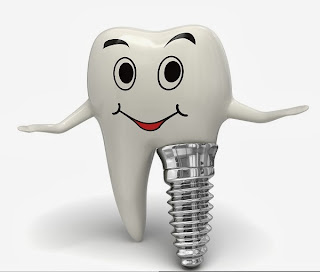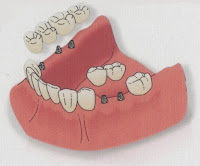What do you know about Dental Implant ?
Dental implants have become the treatment of choice to replace lost or missing teeth, and when done under proper surgical technique. As long as you have sufficient bone density in the area surrounding the teeth you want to replace with dental implants, you are an suitable for dental implant surgery. Even if you're missing the majority of your teeth, dental implants will work for you. But most of the people who decide to get dental implants want them as replacements for their uncomfortable and insecure bridges and partial dentures.
How can you avoid issues during Dental Implants?
1. Do some research on the practitioner who is recommending the implant and whether he or she has experience in implant dentistry.
2. Make sure that the individual placing dental implant has surgical experience from an accredited specialty program or an extensive surgical course with proper training.3. Prior to having the implant placed, consult with a general dentist or prosthodontist so that the implant tooth can be properly treatment planned and ultimately, properly restored.
4. At your initial surgical consultation visit, ask your dentist about the type of dental implant he or she uses. Ask about how much research has been completed on that specific type of implant and it's success and survival rates.
5. Finally, speak to your doctor at length and inquire as to the type of implant being placed and his or her reason for recommending that type of implant.
Causes of Failure:
One person having multiple implants
Statistics have shown that risk of dental implant failure is about five percent for lower jaw implants and ten percent for upper jaw implants. The most confusing aspects of dental implant failure is that in one person having multiple implants, perhaps all but one of the implants will be successful. There has been no way, to this point, to determine what causes selective dental implant failure.
Result of bacteria present in the jaw-bone
Some dental surgeons have suggested that this kind of dental implant failure is the result of bacteria present in the jaw-bone before an implant is inserted; when the implant is screwed into the bone, it unleashes the bacteria and turns them loose in the tissue surrounding the implant. As long as the other implants are placed in bacteria free bone, they will heal cleanly and quickly, but the germ-infested implant will eventually become inflamed, never healing correctly, and the implant will eventually fail.
Patient's neglect of aftercare
Dental implant failure can also be the result of the patient's neglect of aftercare. The dental surgeon will provide a clear set of instructions on caring for the new implant, and it is essential that the instructions be followed. If, in spite of maintaining the implant properly, the patient still develops swelling or tenderness around the implant, it could be a sign of infections and the dentist should be consulted as soon as possible.
Whatever the underlying cause of a dental implant failure, the failure is most likely to surface shortly after the implant procedure. Anyone experiencing excessive discomfort or bleeding after an implant procedure should contact their dental surgeon immediately.
One of the dentist in rohini, Dr.Ashish Gupta is good in doing successfull dental implants in delhi at low cost. You can also find more info on dental implant treatment at dentist-india-delhi.com.
For contact: guptasdentalclinic@gmail.com











